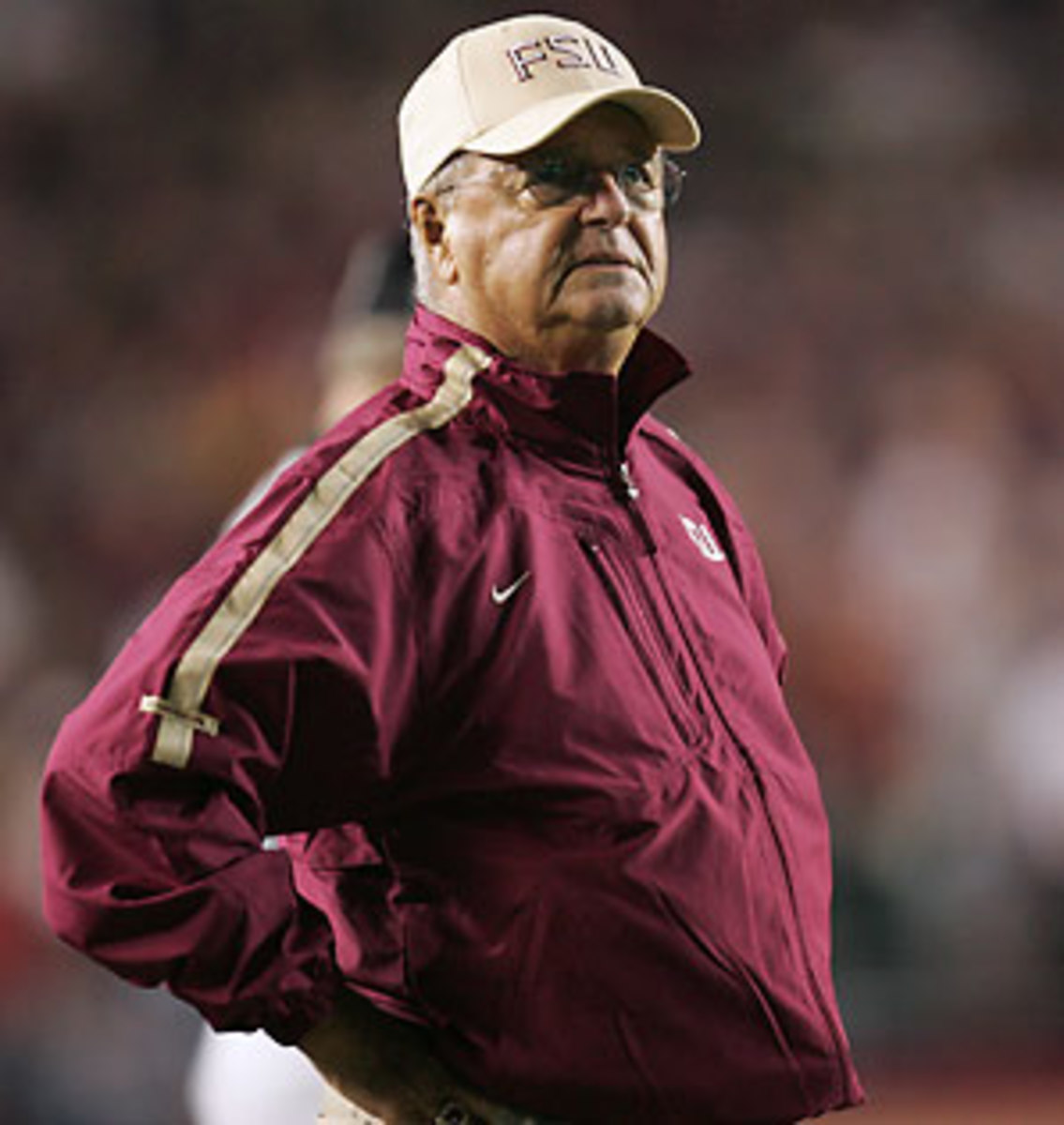
As FSU fights sanctions, Bowden's shot at record hangs in balance
A syllabus for a summer 2007 section of MUH 2051 at Florida State describes the course as "an introductory survey of traditions and transformations of music in global perspective, exploring music both as a phenomenon of sound and a phenomenon of culture." Any future syllabi may need to include another key detail.
This is the course that cost Bobby Bowden the all-time wins record.
Or is it?
The NCAA decreed Friday that, among other penalties, Florida State must vacate all victories in which its teams used players who were ineligible because they cheated in the online music class described above. FSU president T.K. Wetherell, who played football at the school from 1963-67, fired back, saying the school will happily comply with scholarship reductions and probation, but it wants a clarification on the ruling to vacate victories, which could cost the men's track team an NCAA title and, more importantly, could drop football coach Bowden so far behind Penn State's Joe Paterno in the race to become Division I-A's all-time winningest coach that Bowden could never make up the difference.
If the members of the NCAA's committee on infractions explained the concept of when exactly a player is ruled ineligible to FSU officials as poorly during the investigation as vice chair Dennis Thomas did during a 45-minute teleconference with reporters Friday, the Seminoles may have a case. Thomas, the commissioner of the MEAC, talked around the issue for more than a half-hour before NCAA spokeswoman Stacey Osburn finally chimed in with the key piece of information. In the eyes of the NCAA, a player becomes ineligible the moment he or she breaks a rule.
That means the 61 athletes from 10 different sports forfeited their eligibility -- at least temporarily -- the second they accepted answers from a tutor. In football, those violations could have taken place at some point during the seven-win 2006 season. Now, here's where it gets interesting. The NCAA has left it up to FSU officials to determine exactly when those violations occurred and how many of those athletes competed between the moment they cheated and the moment they were suspended in 2007.
"We just don't understand the sanction to vacate all wins in athletics contests in which ineligible student-athletes competed because we did not allow anyone who we knew was ineligible to compete," Wetherell said in a statement. "Our position throughout the inquiry was that as soon as we knew of a problem, they didn't play."
Wetherell, who hinted that the program may appeal the vacation order, is correct. The program suspended all the athletes as soon as it could prove each had cheated. That included the suspension of more than two dozen football players for the 2007 Music City Bowl with an additional three-game suspension tacked on in 2008 for players who still had eligibility remaining.
FSU athletic director Randy Spetman, who was hired after the fraud was discovered, was equally mystified. "Our independent investigation concluded that our coaches did not know about the academic misconduct and never knowingly played any ineligible student-athlete," Spetman said. "The NCAA's report does not dispute that conclusion. Some of our student-athletes engaged in academic misconduct -- and we will suffer the consequences -- but I believe vacating wins is just wrong."
There is a recent precedent. In January, Arkansas had to vacate the 2004 and 2005 men's outdoor track and field titles after the NCAA determined sprinter Tyson Gay was ineligible because he had received impermissible transportation as well as improper aid in a correspondence course before he enrolled at Arkansas. In that case, Arkansas officials didn't discover Gay was ineligible until after former assistant coach Lance Brauman was indicted on mail fraud charges in December 2005.
Thomas said that in formulating the penalty, committee members did not consider Bowden's chase for the record. "The committee does not get involved with whether a famous athlete or a famous coach is involved -- or if there is a record," Thomas said. "The committee adjudicates the facts." That's easy to say, but some committee members had to know that taking away Bowden's shot at the record would cause Florida State the most pain.
The committee apparently does not want to dirty its hands by determining a specific punishment. Certainly, FSU's internal investigation uncovered the dates in which the fraud was committed. Committee members would then need only look at the sports schedules from that year to determine which wins should be vacated. Instead, the committee left that to FSU's athletic department, which has a vested interest in keeping as many of those wins as possible -- especially the ones on the football field.
So what happens if FSU re-opens the files and determines that, conveniently enough, no football player who cheated took part in an FSU win before he was suspended? Thomas declined to answer that question. Unfortunately for Bowden's record, it's in FSU's best interest to answer that question as truthfully as possible if an appeal fails. Though Thomas didn't address that scenario, the NCAA's likely response would probably include one key phrase.
Remember what happened to SMU?





